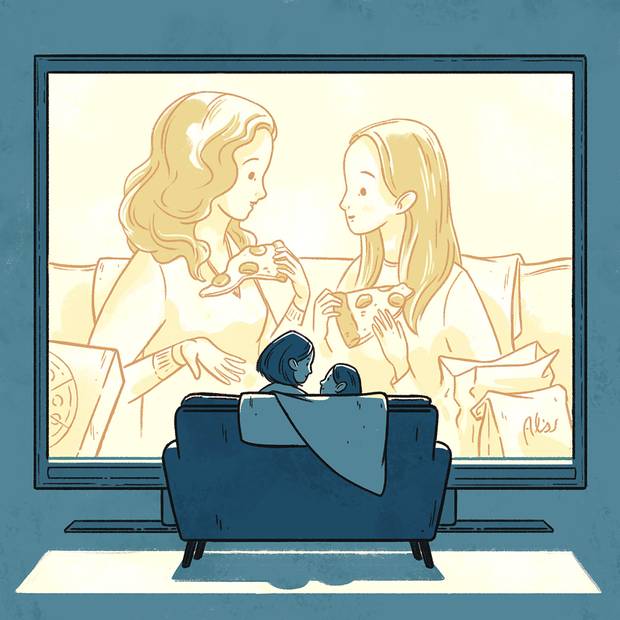Facts & Arguments is a daily personal piece submitted by readers. Have a story to tell? See our guidelines at tgam.ca/essayguide.
It seemed like such a good idea – a mother and daughter spending quality time watching a coming-of-age TV show about a mother and daughter. I loved Gilmore Girls during its original run, and I had memories of it being a decidedly sweet and wholesome show.
Memory is a funny thing.
For the uninitiated, Gilmore Girls premiered in 2000 and aired for seven years. It featured a 32-year-old mother, Lorelai Gilmore, raising her 16-year-old daughter, Rory. Lorelai had Rory out of wedlock, throwing away her wealthy upbringing, and an Ivy League education, when she opted to move to the small town of Stars Hollow and work at the local inn. The show follows Lorelai and Rory's relationship, the relationship they have with Lorelai's parents, and everyday life in a small town filled with eccentric characters.
My daughter was 8 when I first suggested watching the show. She was a little young, granted, but she's a pretty mature kid. Plus, I figured the really adult stuff would go right over her head, and in the beginning, it did. But I'd forgotten that my eight-year-old was like an adult; she was the kid who explained things to other kids.
Right off the bat, there was some mild confusion surrounding Rory's birth. This surprised me, because this kid knows all the different ways babies are born.
"Christopher is her father," I said.
"Christopher is Lorelai's father?" she asked.
"No. Christopher is Rory's father."
There was a moment of silence. She looked almost pained.
"But Lorelai and Christopher aren't married."
Pause.
I looked at her, incredulous. "Where do you think Rory came from?"
"Well … the sperm bank, of course."
Wow. The girl couldn't conceive of the idea that sex would occur outside of marriage. High-five, mom! I had managed to convey all the facts to her, without letting on that sex could be fun. To her, it was simply a way to make babies, so if you weren't married, why have sex?
Suddenly, I realized that maybe this whole Gilmore Girls adventure wasn't the best idea I'd ever had.
But still, we persisted. There were many questions, some long discussions and some scenes we had to watch more than once. But over all, it was going swimmingly.
Until we got to Season 4. There's this episode where all the guys go to a strip club to celebrate a bachelor party. That's when I started to squirm. How do I explain why men watch naked women dance to my innocent little girl? But that was nothing. Only two episodes later, Rory loses her virginity to her married ex-boyfriend. By this time, my daughter had turned 9, but suddenly 9 seemed a lot closer to the age of 3 than 15.
There were days I'd sit on the couch, rocking back and forth, muttering, "We have to stop watching this show. We have to stop watching this show."
"No!" she'd say. "I love it. I love it."
And maybe I should have stopped, but I didn't. And then in Season 5, when Rory and Logan meet, and argue, for the first time, she looked at me and said, "They'll end up kissing. It always starts like this."
My kid, who months earlier didn't know that people had recreational sex, now understood how TV relationships work.
But I realized that when I watched the original run, I grew up with the show, over the course of seven years. Now, with Netflix and binge-watching, my kid was growing up because of the show, in mere months.
Remarkably, she followed most of the storyline and a lot of the subtext. She'd often turn to me and tell me what they were "really talking about." But sometimes, I'd catch her watching me instead of the screen.
"What's up?" I'd ask.
"I know there's something going on that I'm missing. Explain."
I shouldn't have been surprised. This is the kid who, at 6, looked back and forth between me and my husband and said, "Stop arguing quietly in your heads."
Now that we've finished the original series, and the miniseries reboot Netflix put out last year, I feel its absence in our routine. I loved spending that time with her. We bonded over that show, watching relationships begin and end, and talking about subjects we would otherwise never have discussed, such as when Lorelai's produce supplier had a misunderstanding with the guys working his farm – I had to explain the difference between weeding the back four acres, and "weeding" the back four acres.
We had an unspoken deal. She couldn't watch without me, but I had to answer all her questions. And I did. But I stuck to the golden rule of parenting and only answered the question asked. We debriefed when necessary, and honestly, I'm glad she's watching this stuff with me instead of alone or with friends. I can't imagine what kind of answers she would have come up with on her own or concocted with friends.
We live in a world where we can't protect our kids from everything they see or hear. But we can equip them with the ability to decode it. I realize that consuming age-inappropriate media with your kids isn't the answer but, in this case, it worked for us.
If you try it with your own kids though, use caution. Breaking Bad wouldn't be a great way to teach them about chemistry.
Julie Matlin lives in Montreal.
